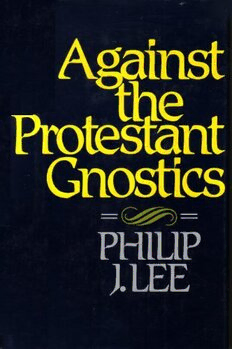
Against the Protestant Gnostics PDF
368 Pages·1987·18.035 MB·English
Most books are stored in the elastic cloud where traffic is expensive. For this reason, we have a limit on daily download.
Preview Against the Protestant Gnostics
Description:
Since the discovery of original gnostic documents at Nag Hammadi in 1945, many scholars have recognized a familiar presence within this ancient heresy. To some authors the main features of gnosticism--belief in a secret revelation available only to an initiated elite, rejection of the physical world, and escape into the self--seemed reminiscent of modern cult groups and secular movements. However, Philip Lee, noting that most of the early gnostics were firmly ensconced within the Church, locates modern gnosticism within the Protestant establishment itself. "As a Protestant, I believe I have identified the elusive modern gnostics and they are ourselves," he writes. In this penetrating and provocative assessment of the current state of religion and its effect on values in society at large, Lee criticizes conservatives and liberals alike as he traces gnostic motifs to the very roots of American Protestantism. With references to an extraordinary spectrum of writings from sources as diverse as John Calvin, Martin Buber, Tom Wolfe, Margaret Atwood and Emily Dickinson among many others, he probes the effects of gnostic thinking on issues ranging from politics to feminism, from ecology to parenthood. The ethical ramifications of such a gnostic turn have been negative and frightening, he maintains. The book points to positive ways of restoring health to endangered Protestant churches. Calling for the restoration of a dialectical faith and practice, Lee offers an agenda for reform, including a renewal of obedience to the scriptures and an affirmation of life and creation within the circle of the extended family.
See more
The list of books you might like
Most books are stored in the elastic cloud where traffic is expensive. For this reason, we have a limit on daily download.
